Matcha tea is a finely-ground preparation of green tea leaves that’s blended with hot water to make a bright-green colored tea.
It’s a fantastic source of the antioxidant and anti-inflammatory compounds that are found in green tea, and as a result, it’s an extremely popular drink for longevity and resistance to chronic disease.
If these are the kind of benefits you’re looking for, our research team has ranked and reviewed the top matcha tea powder on the market.
Research
Rankings
1. Jade Leaf Matcha
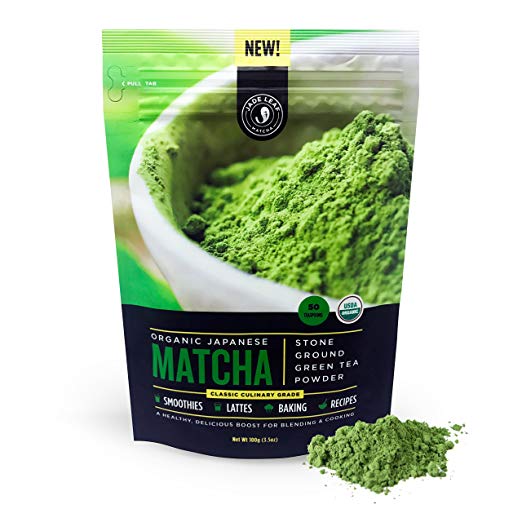
Jade Leaf Matcha is grown in Japan, organically certified, and stone-ground in the traditional manner.
The result is a pure and incredibly popular matcha tea powder that’s just the right consistency to mix up with hot water, but not get gritty or too cloudy.
2. Akira Organic Matcha
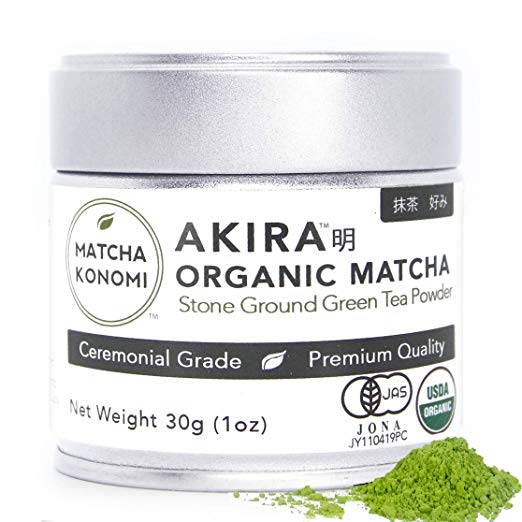
Akira Organic Matcha is “ceremonial grade” matcha green tea, making it a rank above many of the culinary grade products on the market in terms of its taste and flavor profile.
It’s a favorite among dedicated matcha tea drinkers who use traditional preparation methods for its bold and citrusy flavor. If you want authentic matcha tea that’s of the highest quality, go for this product.
3. Encha Ceremonial Organic Matcha
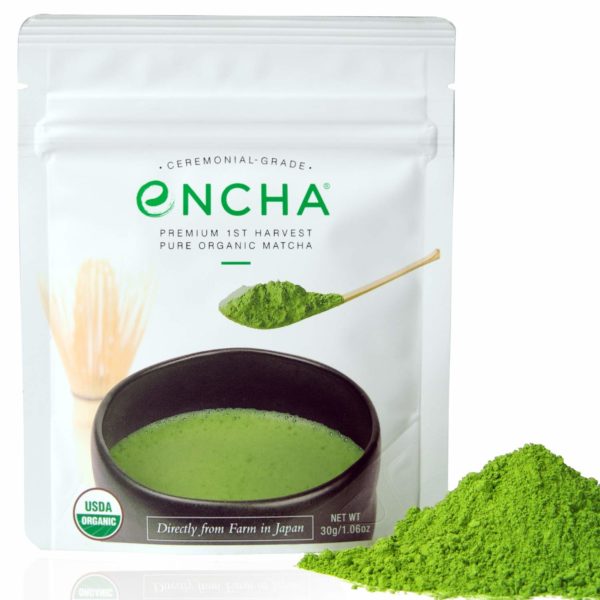
Encha Ceremonial Organic Matcha has a bright, vegetal flavor with no hint of bitterness. This organically certified matcha tea is great for smoothies, lattes, and baking, thanks to its bright and approachable flavor profile.
It may not have the depth and complexity of some of the more refined matcha teas, but that’s not going to affect its health benefits.
4. Kenko Tea
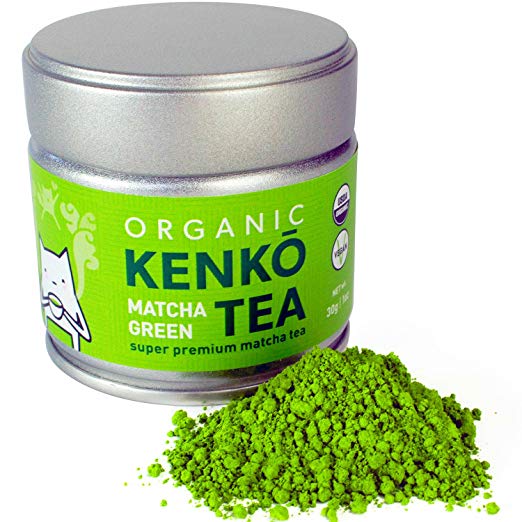
Kenko Tea caters to users who appreciate quality. This ceremonial grade matcha tea comes in a small package, but is highly rated by users for its smooth and well-rounded taste profile.
It’s definitely a matcha tea for drinking versus blending into smoothies or shakes, but if you know you want to drink your matcha tea hot, it’s an excellent choice.
5. Republic of Tea Double Green Matcha Tea
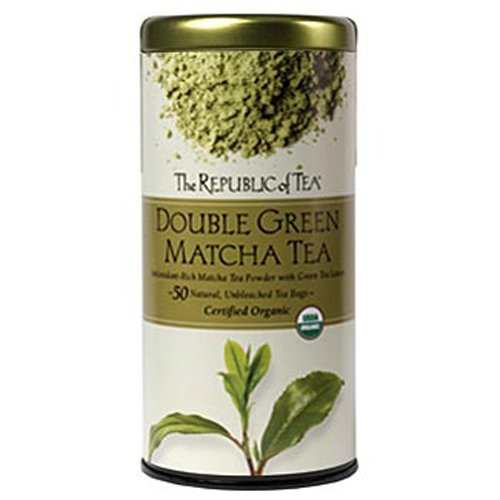
Republic of Tea Double Green Matcha Tea comes in tea satchels like other green teas, so it’s a good fit if you want to be able to make matcha tea in a less messy, more convenient, and equally nutritious package, Republic of Tea is a great fit.
It’s a blend of Chinese and Japanese matcha teas, but all of the ingredients are organically grown, so while it’s not a single-source product, it’s still free of any potential toxins.
6. Starter Matcha
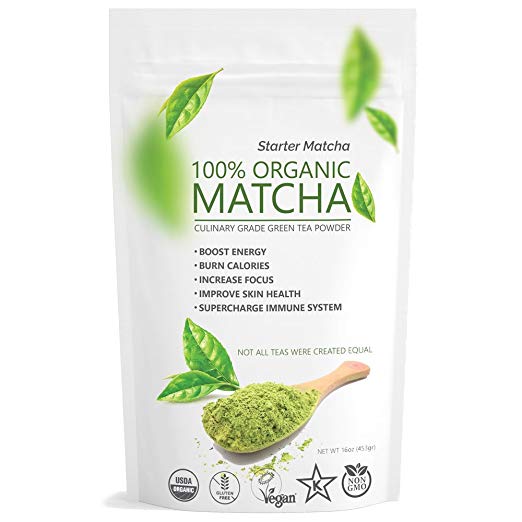
Starter Matcha is certified organic and grown in China. It’s a mild, well-tolerated matcha, so it’s a good option if you aren’t sure if you’ll like the flavor of matcha tea.
Though some matcha teas can be bold, smokey, or earthy, this matcha tea is smoother and more mellow, which makes it appealing to a wide audience.
7. Oriental Organic Tea Matcha
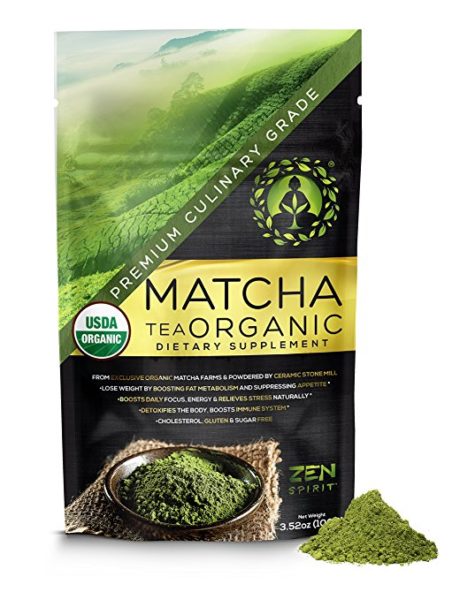
Oriental Organic Tea Matcha is grown in Japan and stone ground. It’s organically certified, too, meaning you don’t need to worry about pesticides or herbicides contaminating the product.
It’s specifically designed for cooking, so it’s a good fit for mixing into smoothies and shakes. However, the taste isn’t quite what you’d get with the higher-grade matcha teas designed for drinking.
Still, it’s a high-purity choice and a good option if you’ll mostly be mixing matcha with other supplements.
8. DrinkMatcha Certified Organic Matcha Tea
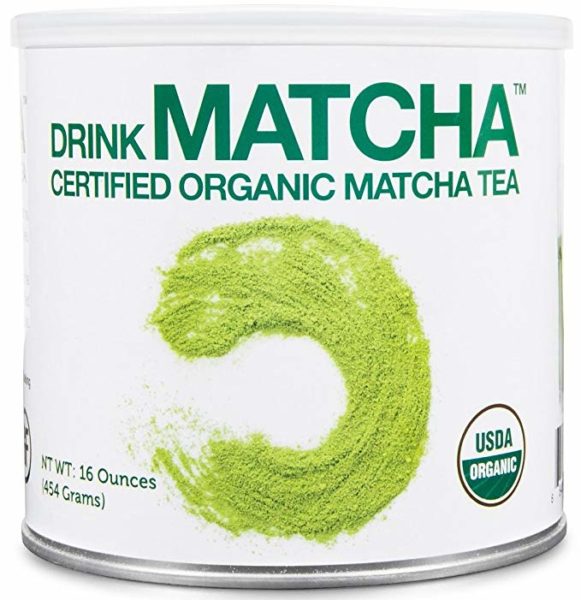
DrinkMatcha Certified Organic Matcha Tea caters to bulk users who go through a lot of matcha tea on a regular basis.
Though the taste doesn’t make it particularly stand out, the 16-ounce tin makes it a favorite among people who blend a lot of matcha into their smoothies and shakes every day.
9. Rishi Super Green Matcha Tea
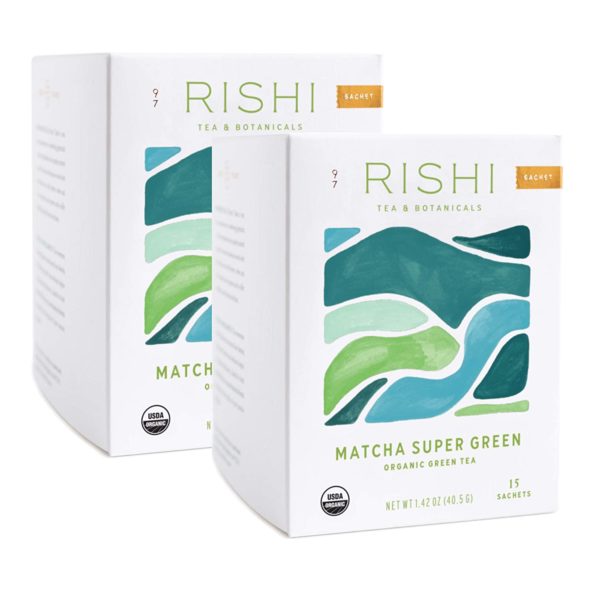
Rishi Super Green Matcha Tea is a blend of both matcha and sencha green tea, which gives it a deeply vegetal flavor that’s still free from smokiness and earthiness.
It comes in prepackaged satchels, making it great for convenience but not at all suited for smoothies, lattes, or shakes.
10. Vitamonk MachaMax
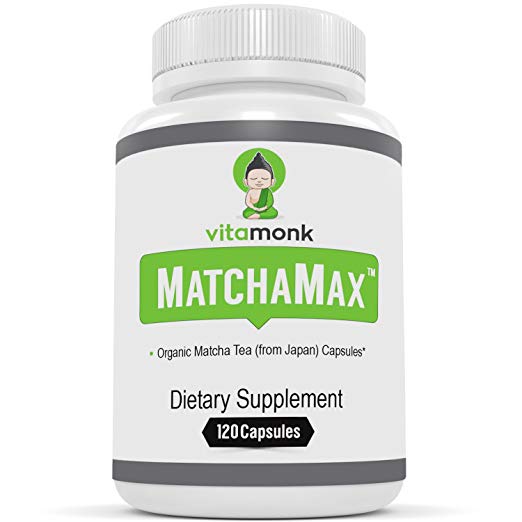
Vitamonk MatchaMax is designed for people who are in a rush—if you don’t have time to sit down and enjoy a hot cup of tea, but still want the benefits of matcha tea, this capsule-based supplement might be the answer for you.
Each vegetarian-friendly cellulose capsule delivers 375 mg of matcha tea powder, and while it’s a convenient way to consume matcha tea, the dosage is lower than what you’d get by making hot tea yourself (typically this dosage is closer to two grams per cup).
Category winners
Best matcha tea overall: Jade Leaf Organic Matcha Green Tea
Whether you’re looking to lose weight, gain energy, or just relax and de-stress, Jade Leaf is a phenomenal pick. This organic matcha tea is a great all-around choice, and takes our top spot overall.
Best matcha tea to mix with milk: Encha Ceremonial Organic Matcha
Matcha green tea is a great compliment to milk—both natural cow’s milk and vegan-friendly substitutes. For a creamier, milkier matcha tea, we recommend Encha Ceremonial Organic Matcha due to its bright, springy flavor.
Best matcha tea for weight loss: Akira Organic Matcha
The caffeine and EGCG in green tea work together synergistically to boost fat oxidation, and Akira Organic Matcha is a perfect choice for supplementing an overall weight loss program. Thanks to its smooth taste, you’ll never get tired of a few cups of matcha green tea every day.
Best matcha tea for more energy: Kenko Tea
Kenko Tea specializes in small-batch matcha tea that’s perfectly suited for energizing your morning (or evening, for that matter). This matcha tea is extra smooth and leaves no bitter aftertaste like lower quality matcha tea products.
Best matcha tea for heart health: Jade Leaf Matcha
Jade Leaf’s traditional processing and organic certification mean it’s packed with powerful antioxidants. These are known to improve heart health, and are a great choice if you’re looking for a change you can make to improve your cardiovascular wellness.
Best organic matcha tea: Jade Leaf Organic Matcha Green Tea
Jade Leaf uses organically sourced green tea leaves to make their matcha tea, which means you don’t have to worry about pesticides, herbicides, and synthetic fertilizers. From a purity standpoint, it’s our favorite.
Who should buy matcha tea?
Matcha tea is safe for most individuals and works well for people trying to lose weight and improve their health. People that are trying to avoid coffee or excess caffeine will also benefit from matcha tea.
Matcha tea should only be consumed by pregnant women under the direct supervision of a licensed medical professional.
How we ranked
High quality and fresh matcha tea powder will be a vibrant green. We axed all products that were yellow or normal green since it indicated that the ingredients were subpar. We also wanted to make sure that all the matcha on our list, like Jade Leaf and Kenko, came from Japan only. Japanese matcha is governed under strict quality laws, and the temperature is ideal for the proper growth of the plant. Products that did not originate from Japan did not make the list.
When ranking our products, the best ones, like Akira, featured only one ingredient: matcha powder. We did not include products that had “matcha powder added” because there was no way for us to determine the amount of matcha powder int eh product.
The delivery method was also considered, with powder being the ideal form of consumption. Capsules like VitaMonk were not highly ranked because matcha tea should be consumed as a beverage, to maximize absorption and avoid an overdose.
Benefits
Matcha shares the health benefits of green tea. All the good things you’ve heard about green tea extract apply to matcha tea as well, since it’s a variety of green tea; but consuming the whole leaf provides more benefits. Matcha tea is one of the most popular beverages worldwide; the wide range of health benefits this type of tea delivers is even more impressive for matcha, a variety that’s grown and made in a slightly different manner.
Research shows green tea has positive effects on a variety of health conditions, including weight control and protection of the cardiovascular system. (1)
All green tea is made with leaves from the Camellia sinensis plant, which is native to China; tea leaves are steeped in hot water, and this process infuses the water with nutrients.
Matcha tea is made using the whole leaf, which has had the stems and veins removed before being stone ground into a very fine powder that is bright green in color.
Before harvest time, the bushes are covered for 20 to 30 days, and resulting shade stimulates an increase in chlorophyll levels in leaves, as well as bumping up amino acid production.
Antioxidant levels and caffeine content are also higher in matcha tea. You can expect caffeine to run at about 35 mg per cup.
Many people use matcha in baked goods or smoothies, and since the taste can be grassy and a bit on the bitter side, a hot drink made with matcha is usually mellowed with milk and sometimes sweetened.
The most common way to prepare matcha tea is the traditional Japanese method. A bamboo spoon known as a “shashaku” is used to measure the powder, which is placed in a small bowl called a “chawan.”
After hot water is added to the bowl, a small bamboo whisk called a “chasen” is used to whip the mixture until it is smooth with a froth on top.
The tea can be prepared in several manners according to preference. “Koicha” is thick tea, and is often used in Japanese ceremonies; two teaspoons of high-grade matcha powder are mixed with an ounce of water, and whisking is minimal, yielding no foam. “Usucha” is thin tea, with only about a half-teaspoon of matcha whisked with 3 to 4 ounces of hot water. “Standard” preparation is a teaspoon of matcha mixed with about two ounces of hot water.
Many people enjoy using the traditional utensils for preparing matcha tea, but you can also make a perfectly fine cup of tea with kitchen tools you have on hand.
Matcha tea is high in antioxidants. The antioxidants in a single cup of matcha are comparable to about three cups of regular green tea.
Animal studies indicate matcha tea can reduce the risk of liver and kidney damage, as well as decreasing triglyceride levels, blood sugar measurements and cholesterol. (2)
Research also suggests matcha is even better at fighting fungi, viruses and bacteria in the body than green tea. (3)
High antioxidant content translates to better protection against the formation of free radicals, which can damage tissues and cells.
Catechins are especially plentiful in matcha, and the most powerful and extensively studied of these is epigallocatechin (EGCG), which is also present in other green teas.
EGCG fights inflammation, stimulates cellular repair processes, and contributes to the maintenance of healthy arteries. (4)
A study analyzing the antioxidant content of various teas found that matcha contained up to 137% more antioxidants than low-quality varieties of green tea; when compared to higher-grade green teas, matcha still came out on top at about 3 times the level of antioxidants. (5)
Besides the obvious benefits of antioxidants, matcha has been shown to have positive effects on several other health conditions.
Matcha tea can improve heart health. Matcha tea can improve many of the biomarkers associated with a higher risk for developing heart disease, which accounts for more deaths worldwide each year than another other cause. (6)
Not only do total cholesterol levels drop with the consumption of green tea, but LDL cholesterol (the bad kind), triglycerides and blood sugar levels fall as well. (7, 8, 9)
It also protects against oxidation of LDL cholesterol, another risk factor in heart disease. (10) People who drink green tea have a 31% less risk of developing this chronic disorder. (11)
Matcha is both popular and effective for weight loss. Often included in weight loss pills, green tea amps up the metabolism so more calories are burned and the body’s ability to use fat for fuel may increase up to 17%. (12, 13)
Not all studies confirm this effect, so it’s important to keep this potential benefit in perspective; drinking green tea will not magically result in weight loss, but can be a useful part of an overall weight management program with appropriate lifestyle modifications.
One review of multiple studies concluded that the weight-loss effects of green tea were not clinically significant. (14)
Matcha tea can have cognitive benefits too. Studies indicate that powdered green tea may help reduce cognitive decline associated with aging, as well as improving brain function. (15, 16)
Researchers believe this may be due to the abundance of an amino acid called L-theanine, which occurs in much larger amounts in matcha than other types of green tea.
Human subjects experience increased alpha brain wave activity in response to L-theanine; this is linked with greater levels of mental relaxation, and may also serve to counteract stress signals.(17, 18)
Brain chemicals that make us feel good are also increased by L-theanine, and this appears to improve memory, concentration and mood. (19)
The L-theanine in green tea acts to moderate the effects of caffeine as well, providing a mild feeling of alertness without leading to the drowsiness people commonly experience when a coffee buzz wears off. (20)
Side effects
Keep in mind that a single cup of matcha tea delivers a similar quantity of nutrients that you would get from drinking three cups of high quality green tea.
Everyone’s body has difference tolerance levels, and sensitive individuals may experience nausea or even suffer liver or kidney damage from excess consumption. (21)
One study noted that some people showed signs of liver toxicity after drinking 6 cups of green tea daily for four months; this would be comparable to two cups of matcha tea each day. (22)
Recommended dose
Because of its highly concentrated nature, matcha tea isn’t something you want to drink all day long; experts recommend keeping consumption to two cups or less daily (though plenty of people do take more than this). Consistent intake over long periods of time seems to be the best way to achieve the health benefits of matcha, since many of the major studies on the benefits of green tea come from long-term studies of people in Japan and China who drink a few cups of green tea or matcha tea every day for years.
FAQ
What does matcha green tea do for you? Matcha tea provides a variety of benefits, including better mental functioning and reduction of stress levels in consumers. One study tested the effects of matcha tea on humans in an attempt to determine whether matcha tea reduces stress and promotes a sense of relaxation in consumers. The study concluded that several types of Matcha tea successfully reduced stress in consumers (23).
Another study conducted required participants to consume matcha tea in several forms, including drink and snack bar form. The participants that consumed these products displayed an increase in mental speed and memory. These effects were most notable in the group consuming the Matcha tea beverage (as compared to the snack bar) and demonstrate the positive effects that Matcha tea may have on the body, particularly on the brain (24).
Nutritionally, matcha tea is full of antioxidants, which reduces the risk of developing diseases like cancer, as well as high levels of vitamins and fiber. The other noted effects include, but are not limited to, an increase in metabolism, detoxification effects, and enhanced mood.
Why is matcha tea so popular now? One of the significant reasons that Matcha tea is so popular is because of the significant health effects associated with the product. At this point, foods high in antioxidants (dubbed superfoods) and foods associated with a “detoxifying” effect are becoming increasingly more popular.
Matcha tea has been connected to both of these concepts, making it a much sought after health food. One of the reasons Matcha tea caught on so quickly is because it is a type of green tea, which has also become wildly popular in the health world. Matcha tea can be three times as healthy and nutrient-dense as green tea, so it’s no surprise why Matcha tea is so popular.
How is matcha different from regular tea? The most significant difference between Matcha tea and regular green tea is the concentration of antioxidants. In a significantly smaller portion, you can consume the same, if not more, nutrients than regular tea, including antioxidants, vitamins, and minerals. Essentially, matcha tea is more nutrient-dense than regular green tea, making it the more popular option between the two.
How much matcha tea should you drink a day? While you can technically drink up to five cups of matcha tea in a day without experiencing any major concerns, the general recommendation is to consume one or two cups per day. With this level of consumption, you will be able to reap all the benefits of the tea without straying into side effect territory.
Is it safe to drink matcha every day? For the average healthy person, it is entirely safe to drink matcha tea daily. The tea provides excellent health benefits that the body thrives on when consumed daily.
It is important to remember that you should only be consuming about one or two cups a day, and consuming more than this recommended amount may yield unfavorable health consequences. In particular, matcha tea has caffeine levels of about 70 milligrams per serving, which, when consumed in a large amount, could be unsafe and produce adverse health consequences.
What is matcha tea? Matcha tea is a type of green tea that is sold in the form of powder worldwide. The powder can then be added to milk, water, or other liquids to be dissolved and add great nutritional value to these beverages. Matcha tea has become extremely popular in recent years and has latched onto the growing popularity of regular green tea.
Is matcha good for skin? Many dermatologists are praising the potential benefits that matcha tea has on the skin, and scientists have begun trying to prove the connection. Some studies have tested the effects of green tea on the skin, with results proving a positive connection between the two.
One particular study conducted on laboratory mice noted a link between green tea extract and the reduction of “aging” appearance within the skin. There is also the potential that green tea can improve skin conditions like acne or inflammation (25).
While these results were produced when using regular green tea extract, it is of importance to mention that matcha tea is more nutrient-dense and essentially “stronger” than regular green tea. With that said, it is reasonable to expect that matcha tea will have the same, if not significantly better, effects on human skin.
Is matcha healthier than coffee? Matcha tea and coffee are comparable in the sense that they both provide caffeine, various nutrients, and deliver health benefits when consumed.
When it comes to caffeine and energy provided by tea, it is more commonly associated with lasting longer than the effects of coffee. So, while coffee does have somewhat higher caffeine levels per serving, the effects are known to wear off sooner. In terms of energy levels, Matcha tea is superior.
Matcha tea also has significant levels of antioxidants in every serving and provides benefits like increased relaxation and greater functioning when it comes to memory and mental speed. While coffee is considered a healthy beverage and has some positive effects on the body, it is not as beneficial as Matcha tea might be.
Is matcha good for weight loss? While matcha tea does not directly lead to weight loss, it does encourage the body to increase its metabolism, which, long-term, may result in weight loss in consumers.
One study recognized a connection between matcha tea and fat burning during exercise. Participants were required to drink matcha tea the day before and hours before the study. Study participants were then required to walk at a brisk pace for a set period of time to determine the fat oxidation, and the results proved an increase. When paired with exercise and a healthy diet, Matcha tea can assist with weight loss and increased health (26).
What is the best time to drink matcha tea? Matcha tea can be consumed at any point of the day and still provide the same health benefits. Because of the caffeine content in each serving of matcha tea, you may want to consume the tea in the morning to provide an energy boost and attempt to prevent insomnia at night.
When consumed periodically throughout the day, you may experience consistent levels of energy, increased relaxation, and improved focus and mental abilities. However, when you consume matcha, tea is an entirely personal preference.
What does matcha taste like? Matcha tea is most often described as being very fragrant with a strong taste. However, this depends on the grade of tea that you purchase and can vary from brand to brand.
Most people consider Matcha tea to have a unique sweet and savory taste, which is not often found in teas. Additionally, it is essential to mention that the taste of Matcha tea is not comparable to that of regular green tea.
Does matcha give you energy? One serving of Matcha tea has about 70 milligrams of caffeine in it, but this can vary greatly depending on the amount of tea you drink and the brand. As compared to the caffeine provided in coffee (about 100 milligrams), matcha tea still has a large amount of caffeine in every serving and still provides the energizing effects of caffeine.
How do you drink matcha powder? Matcha tea is often sold in the form of a powder, rather than a teabag. Generally, matcha tea powder is added to hot water or milk and then consumed. The general consensus is to use one teaspoon of matcha powder for every cup of hot water. If you enjoy stronger tea or are desiring further health benefits, feel free to add more matcha powder to the water or drink larger servings of the tea.
Is matcha tea an anti-inflammatory? Like regular green tea, matcha tea also has anti-inflammatory effects when consumed. In particular, matcha tea includes EGCG, which has been repeatedly recognized for its connection to inflammation reduction. These anti-inflammatory effects can benefit the immune system, the brain, and even skin cells.
Why is matcha tea more expensive than green tea? The reason that matcha tea is significantly more expensive than regular green tea is because of how much work goes into producing matcha tea. The process of creating green tea involves only harvesting the tea leaves, heating them, and then drying them. This allows companies and farms to produce larger quantities of green tea with less work required.
Matcha tea requires a more extensive process than regular green tea. Not only do workers have to handpick the leaves, but they also must manually remove the stems and veins and then grind the remaining content by hand.
Another thing to consider when it comes to the price of matcha tea is the location in which the tea is being produced. Because Matcha tea is produced mainly in Japan, the price of the tea itself will be higher due to the cost of shipping the tea to other countries, particularly across the globe. There are more affordable options available by mainstream distributors, but the quality is not as good. Generally speaking, if you are looking for high-quality matcha tea, you will likely have to spend a little bit more money.
Where can you buy matcha tea? Matcha tea is available almost anywhere tea is sold. Major retailers like Amazon and Walmart stock the item, but you can also find matcha tea powders in various health food stores.
When does matcha tea expire? When left unopened in a refrigerator, matcha tea has a shelf-life of about one year. However, if the Matcha tea is opened, the shelf-life is significantly reduced down to just a few weeks.
What is flavored Matcha tea? If you’re dissatisfied with the taste of natural matcha tea, there are flavored varieties available for purchase on Amazon and other sites. Some examples of flavors of matcha tea include raspberry and peach, though some distributors offer a wide range of flavored Matcha tea in sample packs
With the addition of flavoring comes changes to the nutritional content of the tea itself. It wouldn’t be unusual for flavored matcha tea to have higher levels of sugar or carbohydrates due to the added flavors. If you are focused on maintaining a specific diet and nutritional intake, check the labeling for flavored Matcha tea for any inconsistencies with your diet.
Why is flavored matcha tea popular? The major reason for flavored matcha tea is to lure customers who want the health benefits of matcha tea, but don’t like the taste. Matcha tea can be referred to as an acquired taste, and the average person may not enjoy the natural taste.
To cater to the needs of the remainder of the population, significant distributors are developing flavored Matcha tea to increase sales and generate more customers.
Related articles
Recap
Matcha tea is a specially grown and prepared version of green tea. It has powerful antioxidant effects, and is very popular among people looking to increase their resistance to chronic diseases and fight off weight gain and the health problems that come along with it.
It’s best to consume one or two cups per day, but to maintain this intake on a consistent basis over time to get all of the benefits of matcha tea. Overall, it’s an excellent and proven way to boost your body’s antioxidant and anti-inflammatory power.
For BodyNutrition’s #1 matcha tea recommendation, click here.